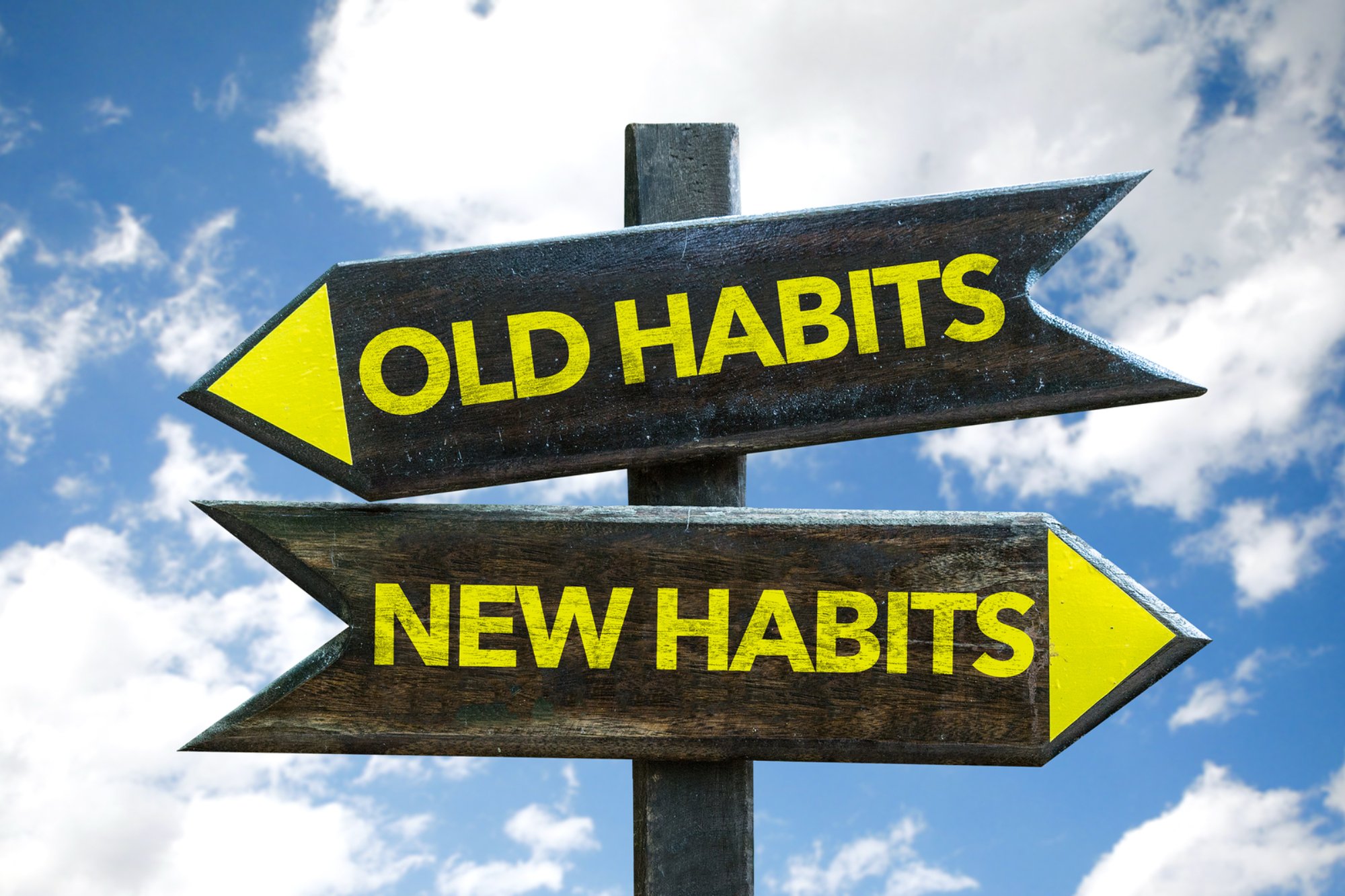Do you ever feel like you're stuck in a loop? Like no matter how hard you try, certain habits just won’t let go? Trust me, you're not alone. Breaking bad habits can be one of the toughest battles we face in life. Whether it's procrastination, overeating, or even something as simple as scrolling endlessly on social media, these patterns can hold us back from reaching our full potential. But here's the good news: habits can be broken, and the power to change is within you.
Imagine waking up every day feeling refreshed, motivated, and ready to tackle life’s challenges without being weighed down by old, unproductive routines. Sounds amazing, right? Well, it’s entirely possible if you’re willing to take the first step toward breaking those habits that no longer serve you. In this article, we’ll dive deep into understanding why habits form, how they affect our lives, and most importantly, practical strategies to break free from them.
But before we get started, let’s address the elephant in the room. Changing habits isn’t easy, but it’s definitely doable. It takes commitment, self-awareness, and sometimes even a little help from friends or professionals. So buckle up, because we’re about to embark on a journey to transform your life by breaking the habits that are holding you back.
- Unveiling The Enigmatic Brad Reckling A Deep Dive Into His Life Legacy And Impact
- Dodge Charger Symbol The Iconic Emblem That Commands Respect
Understanding the Science Behind Habits
Alright, let’s talk science for a sec. Habits are essentially automatic behaviors that we repeat regularly without much thought. They’re like little shortcuts our brains create to save energy. But here’s the thing: not all shortcuts are good for us. Some habits, like brushing your teeth or exercising daily, are awesome. Others, like biting your nails or constantly checking your phone, can be pretty harmful.
According to research published in the Journal of Neuroscience, habits are formed through a process called "neuroplasticity." This fancy word basically means that our brains are constantly changing and adapting based on our experiences. When we repeat a behavior over and over, neural pathways in our brains get stronger, making that behavior easier to perform in the future. Cool, right? But also kinda scary when you think about it.
Why Do Bad Habits Form?
Let’s break it down. Bad habits usually form because they provide some kind of immediate reward or relief. For example, if you’re stressed, you might reach for a cigarette or a bag of chips because it makes you feel better in the moment. Over time, your brain starts associating that behavior with feeling good, even though it might not be good for you in the long run.
- Chappell Roan Rolling Stone Pictures The Untold Story Behind The Iconic Photos
- Nicole Blue The Rising Star Whorsquos Taking The World By Storm
Here’s a quick list of common reasons why bad habits stick around:
- They offer instant gratification.
- They’re triggered by stress or boredom.
- They’ve become so automatic that we don’t even realize we’re doing them.
- They’re reinforced by our environment (like having a vending machine at work).
Now that we understand why habits form, let’s talk about how to break them. Spoiler alert: it’s gonna take some work, but it’s totally worth it.
The Impact of Bad Habits on Your Life
Let’s be real for a second. Bad habits don’t just disappear overnight. They stick around because they serve a purpose, even if that purpose isn’t always positive. But here’s the kicker: these habits can have a major impact on your life, both physically and mentally. For example, if you’re constantly procrastinating, it can lead to missed deadlines, increased stress, and even burnout. And if you’re indulging in unhealthy eating habits, it can affect your physical health and energy levels.
But it’s not all doom and gloom. The good news is that breaking these habits can lead to some pretty amazing benefits. Imagine feeling more productive, healthier, and happier. Sounds pretty awesome, right? Let’s take a closer look at how bad habits can affect different areas of your life.
Physical Health
Let’s start with the obvious one: physical health. Habits like smoking, overeating, or not getting enough exercise can have serious consequences for your body. According to the World Health Organization, unhealthy lifestyle habits contribute to a wide range of health issues, including heart disease, diabetes, and obesity. But here’s the thing: small changes can make a big difference. By breaking these habits, you can improve your overall health and reduce your risk of developing serious conditions.
Mental Health
Now let’s talk about mental health. Bad habits like procrastination, social media addiction, or even negative self-talk can take a toll on your mental well-being. They can lead to increased stress, anxiety, and even depression. But the good news is that breaking these habits can have a positive impact on your mental health. By learning to manage stress and break negative thought patterns, you can improve your mood and overall quality of life.
Identifying Your Harmful Habits
Alright, let’s get personal. The first step in breaking a habit is recognizing that it exists. Sounds simple, right? But here’s the thing: sometimes we’re so used to our habits that we don’t even realize we’re doing them. That’s why it’s important to take a step back and assess your behavior.
Here’s a quick exercise: think about your daily routine. Are there any behaviors that you repeat regularly that might not be serving you? Maybe it’s checking your phone first thing in the morning, or reaching for a snack every time you feel stressed. Once you’ve identified these habits, write them down. Trust me, it’ll make it easier to tackle them later.
Common Harmful Habits
Let’s talk about some of the most common harmful habits that people struggle with. These might include:
- Procrastination
- Overeating or emotional eating
- Smoking or vaping
- Excessive screen time
- Negative self-talk
Now, here’s the important part: not all habits are created equal. Some might seem harmless, but they can still have a negative impact on your life. For example, spending too much time on social media might not seem like a big deal, but it can lead to feelings of inadequacy or FOMO (fear of missing out).
Strategies to Break Bad Habits
Okay, so you’ve identified your harmful habits. Now what? Well, the next step is to develop strategies to break them. This is where the real work begins. But don’t worry, we’ve got you covered. Here are some practical tips to help you break free from those pesky habits.
Replace the Habit
One of the most effective ways to break a habit is to replace it with a healthier one. For example, if you’re trying to quit smoking, you might try chewing gum or using a stress ball instead. The idea is to give your brain a new behavior to focus on, which can help reduce cravings.
Set Clear Goals
Having clear, achievable goals can make a big difference when it comes to breaking habits. Instead of saying “I want to stop procrastinating,” try setting specific goals like “I will complete one task every morning before checking my phone.” This gives you something concrete to work toward and can help keep you motivated.
Overcoming Challenges and Staying Motivated
Let’s be honest: breaking habits isn’t always easy. There will be times when you feel like giving up, and that’s okay. The key is to stay motivated and keep pushing forward, even when things get tough.
Here are a few tips to help you stay on track:
- Celebrate small victories along the way.
- Surround yourself with supportive friends and family.
- Remind yourself why you started in the first place.
Dealing with Setbacks
Setbacks are a natural part of the habit-breaking process. The important thing is not to let them derail your progress. If you slip up, don’t beat yourself up about it. Instead, take it as a learning opportunity and use it to strengthen your resolve.
Seeking Professional Help
Sometimes, breaking a habit on your own can be really tough. That’s where professional help comes in. Whether it’s a therapist, life coach, or even a support group, having someone to guide you through the process can make a huge difference.
For example, cognitive-behavioral therapy (CBT) is a popular method used to help people break harmful habits. It focuses on identifying negative thought patterns and replacing them with more positive ones. And guess what? It’s been proven to be super effective!
Building New, Positive Habits
Now that we’ve talked about breaking bad habits, let’s talk about building new, positive ones. This is where the real transformation happens. By replacing old habits with new, healthier ones, you can create lasting change in your life.
Here are a few tips for building positive habits:
- Start small and focus on one habit at a time.
- Make it a daily practice, even if it’s just for a few minutes.
- Track your progress and adjust as needed.
The Power of Community and Support
Let’s face it: breaking habits is easier when you have a support system in place. Whether it’s friends, family, or even an online community, having people who understand what you’re going through can make a big difference.
Here’s a fun fact: research shows that people who participate in support groups are more likely to successfully break harmful habits. So don’t be afraid to reach out and connect with others who are on the same journey as you.
Conclusion: Take Action Today
Breaking harmful habits isn’t easy, but it’s definitely worth it. By understanding why habits form, identifying the ones that no longer serve you, and implementing practical strategies to break them, you can transform your life in amazing ways.
So what are you waiting for? Take action today and start breaking those habits that are holding you back. And don’t forget to share this article with your friends and family. Who knows? You might just inspire someone else to make a positive change in their life.
Table of Contents
- Holly Halle The Rising Star In The World Of Fashion And Entertainment
- Elementary Cast Season 4 A Deep Dive Into The Characters And Their Journey


